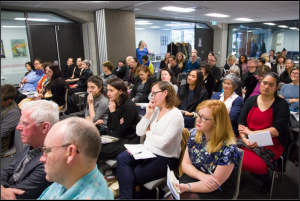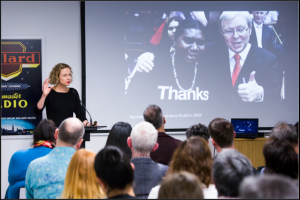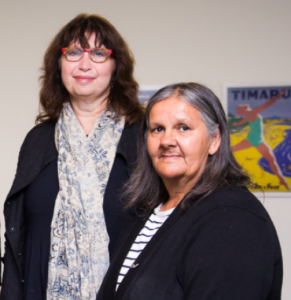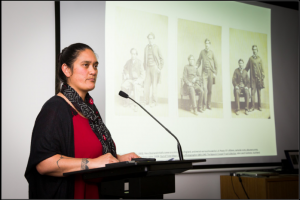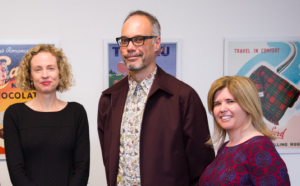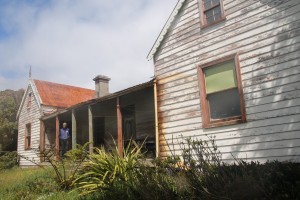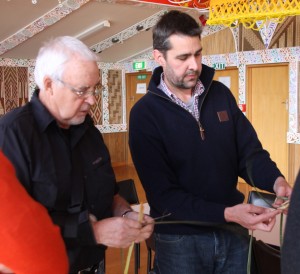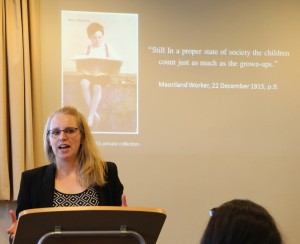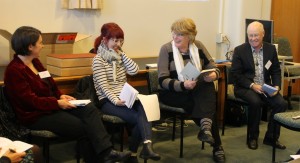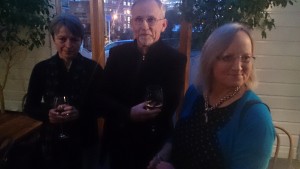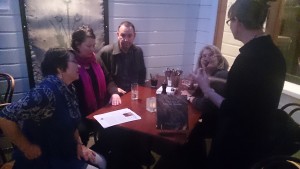Ballantyne wins W H Oliver prize
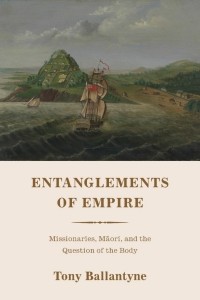 Congratulations to Centre director, Professor Tony Ballantyne, for winning the W.H. Oliver prize. This was the first time the prize has been awarded, for the best recent book on any aspect of New Zealand history. Tony’s book, Entanglements of Empire: Missionaries, Māori, and the Question of the Body, published by Auckland University Press, was the winning entry, announced yesterday at the New Zealand Historical Association conference in Christchurch. The books of two other CROCC members, Tom Brooking’s Richard Seddon: King of God’s Own and Angela Wanhalla’s Matters of the heart: A History of Interracial Marriage in New Zealand were shortlisted, as was that of Melissa Matutina Williams, Panguru and the City: Kāinga Tahi, Kāinga Rua.
Congratulations to Centre director, Professor Tony Ballantyne, for winning the W.H. Oliver prize. This was the first time the prize has been awarded, for the best recent book on any aspect of New Zealand history. Tony’s book, Entanglements of Empire: Missionaries, Māori, and the Question of the Body, published by Auckland University Press, was the winning entry, announced yesterday at the New Zealand Historical Association conference in Christchurch. The books of two other CROCC members, Tom Brooking’s Richard Seddon: King of God’s Own and Angela Wanhalla’s Matters of the heart: A History of Interracial Marriage in New Zealand were shortlisted, as was that of Melissa Matutina Williams, Panguru and the City: Kāinga Tahi, Kāinga Rua.
.
Three Centre members finalists for best History book award
Professor Tony Ballantyne, Professor Tom Brooking, and Dr Angela Wanhalla, are three of the the four finalists for the inaugural W.H. Oliver Prize for best book on New Zealand history, to be awarded next week at the New Zealand Historical Association conference. The books are Tony Ballantyne, Entanglements of Empire: Missionaries, Maori, and the Question of the Body (AUP); Tom Brooking, Richard Seddon, King of God’s Own: The Life and Times of New Zealand’s Longest Serving Prime Minister (Penguin); and Angela Wanhalla, Matters of the Heart: A History of Interracial Marriage in New Zealand (AUP).
All three finalists are academics within the Department of History and Art History, but also members of the Centre for Research on Colonial Culture. For the full story, read the latest article in the Otago Bulletin Board.
Puke Ariki Trust Scholarship
The Puke Ariki Trust Scholarship, valued at $5000, supports the studies of a postgraduate student whose research relates to Taranaki’s social history. Puke Ariki is Taranaki’s Museum, Library, Archive Centre based in New Plymouth, renowned for its extensive heritage collections. If you are interested in this scholarship, check out the Puke Ariki Trust Scholarship Terms and Conditions.
Stimulating symposium on Indigenous Photographic Histories
Practitioners, curators, archivists, scholars and others flocked to the Indigenous Photographic Histories Symposium held at the National Library in Wellington on 5 November, an immensely successful one-day event co-organized by Paul Diamond (Alexander Turnbull Library), Angela Wanhalla (CROCC/University of Otago) and Jane Lydon (University of Western Australia, Perth).
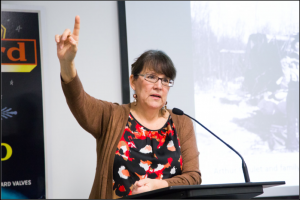
Keynote speaker: Professor Sherry Farrell Racette. Photo: Mark Beatty, Imaging Services, National Library
The symposium kicked off with two keynotes. The first, Professor Sherry Farrell Racette (Manitoba) on “Enclosing some Snapshots”: James P. Brady, Photography and Political Activism, showed how photography was such an integral part of the work of this well-known Métis activist. A self-taught community-based photographer, Brady used it record Metis life at a time when these communities were impoverished and its people lacked rights.
Professor Jane Lydon then gave Aboriginal Transformations of the Photographic Archive on how Aboriginal communities are now using historic photographs. She traced the emotional and healing properties of photographs, and echoing Sherry Farrell Racette’s keynote, pointed to the link between photography, rights and political activism. Drawing upon her Australian Research Council-funded project that identifies and returns Aboriginal photographs held in European collections, Jane noted that while photographs carry the burden of the colonial past, Aboriginal families see them as ways to connect with family and place. To read more about that ARC project have a look at the website: Returning Photographs: Australian Aboriginal Photographs from European Collections
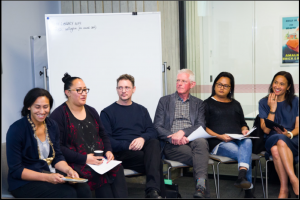
From left: Edith Amituanai, Nina Tonga, Brook Andrew, Paul McNamara, Yuki Kihara, and Jeanette Wikaira. Photo: Mark Beatty, Imaging Services, National Library
After morning tea, a panel of shorter talks ensued, first from three practitioners/artists: Edith Amituanai (Unitec), on the ethics of taking photographs in terms of her own work. Edith spoke about her community-based photography, recording Samoan people and their everyday lives in New Zealand and beyond. She gave us one of the most evocative sentences of the day when she described a photograph as an ‘incomplete utterance of a sentence’; Brook Andrew of Wiradjuri (Monash) discussed the complexities of representation, and his own obsession with the colonial archives, which he uses in his artwork; and Yuki Kihara gave a tour-de-force presentation on the intellectual work underpinning her recent “A Study of a Samoan Savage”, which was inspired by early “scientific” photographs of Samoans in the archive. These were followed by reflections from three people who deal with collections: Paul McNamara on how photographers had utilized the archives in various exhibitions at the McNamara Gallery in Whanganui; Nina Tonga, Te Papa’s Curator Pacific Cultures, on the photography of George Crummer, a trader in the Cook Islands from 1890; and Jeanette Wikaira, Kaituitui Ratonga Māori on how Kai Tahu families interact with the photographic archives of the Hocken Library.
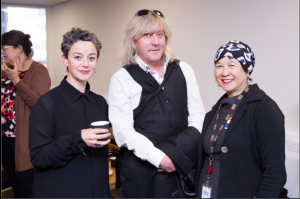
Helen Brown (left) enjoying a break in proceedings with Lyndon Fraser (Canterbury University), and Lynette Shum, Oral History Advisor at the Turnbull. Photo: Mark Beatty, Imaging Services, National Library
The suite of papers reflected on community, place and family. Natalie Robertson of AUT was unable to be at the symposium, but her Siting Mauri through Living Film and Photography using material relating to Ngāti Porou and the Waiapu River was wonderfully and elegantly presented for her by AUT doctoral candidate and photographer Ngahuia Harrison. Helen Brown of Ngai Tahu Archives presented on Wiremu Teira and his Māori Friends where she discussed the Pākehā writer and photographer William A. Taylor and his relationships with Ngāi Tahu communities.
New Zealanders are probably unaware that Aboriginal families, not allowed to live alongside white Australians were relegated to “fringe camps” on the outskirts of outback towns. Karen Hughes (Swinburne University) and renowned Ngarrindjeri weaver Aunty Ellen Trevorrow (Camp Coorong Race Relations Cultural Education Centre) showed life in Ngarrindgeri camps through the intimate and familial portraits made by Aboriginal women photographers.
Chanel Clarke, Māori Curator, Auckland Museum, rounded off the after-lunch session with Dressing the Part: Queen Victoria’s Māori Subjects, on the intersections of dress, photography and colonialism during a visit of Māori to England in the early 1860s. The symposium was lucky to have three “keynote listeners” who all gave their impressions and reflections on the earlier sessions: Damon Salesa (Auckland), Jo Smith (Victoria), and Tina Makereti (novelist, Curator Māori, Museums Wellington). All three touched upon several important themes that united all the presentations: the affective power of photography, the ethics of photography, the rich and varied methodologies being deployed, and the ongoing power of colonial images in the present day.
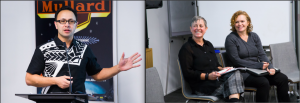
Wonderful “keynote listeners”: Damon Salesa, Jo Smith, and Tina Makereti. Photos: Mark Beatty, Imaging Services, National Library
It was wonderful to be exposed to insights from so many indigenous scholars and practitioners. It was also gratifying to hear how indigenous communities are now using the photographic archives, even those heavily underlain with the violence of colonialism, for their own purposes, as art, for rediscovering histories, and reconnecting communities.
He haerenga ki Awarua
On Thursday 29th, CROCC member Michael Stevens hosted a number of fellow members, and other guests at his home marae, Te Rau Aroha, at Bluff, to look at Māori/maritime history and how this aligns with Michael’s Marsden-funded project, A World History of Bluff.
As well as visiting a number of the locales that inform Michael’s work, we were also able to give short presentations to local people at the marae on the Thursday evening. These included: Atholl Anderson (Retired, ANU): “Archaeology in the Southern Margins”; David Haines (Waitangi Tribunal): “Tuhawaiki’s Cannon”; Tony Ballantyne (Otago): “An Indian Sailor in the South”; Jonathan West (OTS): “A triangulated moment in the Tasman Triangle: Port Pegasus, 1826”; Angela Wanhalla (Otago): “‘Granny Harrold’: The Transnational Life of an Indigenous Woman”; Lachy Paterson (Otago): “Southern Kāi Tahu and Māori-language newspapers”; and Jane McCabe (Otago): “Kalimpong Kids in Southland”. Regular draws also saw a number of books given to attendees.
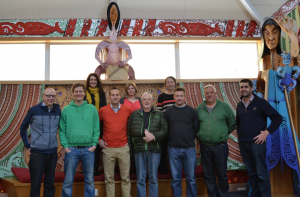
From left: Tony Ballantyne, David Haines, Frances Steel, Ryan Jones, Angela Wanhalla, Atholl Anderson, Jane McCabe, Jonathan West, Lachy Paterson, Michael Stevens.
There were several highlights. Serendipitously Sir Tīpene O’Regan, the upoko of the local Awarua Rūnaka was in town, and kept us entertained with stories on the Friday night. And on Saturday we were lucky to visit Stewart Island and visit several historical spots, including the “Travellers Rest”, a boarding house run by a Agnes Harrold, a nineteenth-century Metis woman from Manitoba. A big thank you to Michael and his whānau for their hospitality, and the ringa wera at the marae who kept us so well well fed while we were there.
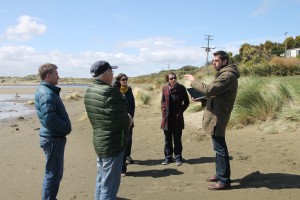
Trying to keep warm at Omaui Beach. Not only a site of shipwreck, but of the long and continuing presence of a number of Kāi Tahu whānau.
Seminar on “Digital Interventions”
Apologies for the late notice. Dr. Tim Sherratt, one of Australia’s leading scholars of digital humanities will be talking today 1.00-3.00pm about some of his current projects, and explore some useful digital tools, in the Science Library Seminar Room (Ground Floor, University of Otago Science Library). Dr Sherratt works both as an academic at ANU, and as part of the management team of Trove – Australia’s version of our Papers Past. Click here for more details.
The Canadian Invasion.
It seemed like Dunedin had been invaded by Canadian academics at recent Centre events.
The first event was a half-day symposium, “Colonial Families: New Perspectives” on 20 August, organized by Angela Wanhalla and also funded through her Royal Society Rutherford Fellowship. This featured Laura Ishiguro (University of British Columbia), with ‘“Say nothing”: gossip, intimation, and the limits of intimacy in a colonial family’, a paper that investigated the mixed-race David-Phillipps family, and the gossip and silences around the marriage and children. Jennifer Ashton (Auckland), spoke on ‘Respectability and the Half-caste: The Russells and Manings in 19th Century Hokianga’, on the efforts of early elite Pākehā males for their mixed-race children to gain the cultural capital necessary to become respectable in the emerging settler society. Crystal Fraser (University of Alberta) gave a paper on ‘Reconciling the Future: Past and Present Understandings of Gwich’in Families in the Northwest Territories, Canada’ which looked at her own family’s history living in the “two worlds” of Indigenous and “modern” Canada. Erica Newman (University of Otago) finished this session with the paper ‘The Care of Fiji’s Orphan’s During the Colonial Period, 1874-1970’ looking at guardianship, adoption and orphanages in colonial Fiji, with particular emphasis on Fijian Indian children.
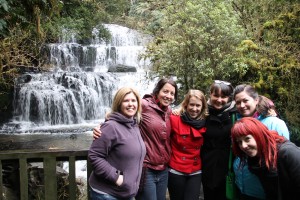
Canadian guests at the Pūrākaunui Falls, in the Catlins, with members of Otago’s History programme, on the weekend. From left: Angela Wanhalla, Jane McCabe, Kate Stevens, Laura Ishiguro, Crystal Fraser and Kristine Alexander.
On 24 and 25 August the two-day symposium, ‘”Unpicking the Tapestry”: Children and Young People in British Colonial Contexts’ was held at the Hocken Collections. CROCC member, Hugh Morrison, gathered a great range of scholars to look at colonial children’s history. This began with a mihi whakatau (welcome) from Mark Brunton, Māori Research Officer (Office of Māori Development, University of Otago).
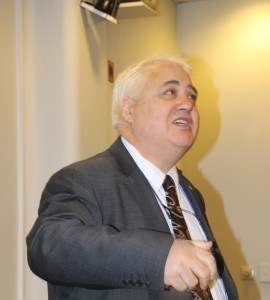
Kei te mihi atu a Mark Brunton (Ngāi Tahu) ki ngā tāngata i tae mai ki te hui rangahau. Mark Brunton (Ngāi Tahu) greeting the symposium attendees.
The first day’s talks were as follows: Crystal Fraser (University of Alberta) ‘”We went through hell together me and my friend; we cried together, we got shit together, and we fought together”: Student Life at Hostels in Northern Canada, 1950s to 1980s’; Chris Brickell (University of Otago) ‘Transport, Modernity and the Making of Adolescent Cultures’;
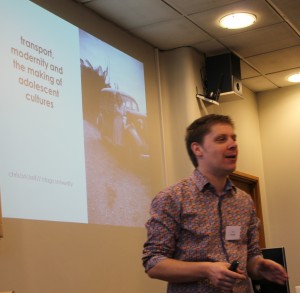
Chris Brickell spoke about how modes of colonial transport operated as cultural spaces for New Zealand adolescents.
Susan Cahill (Concordia University) ‘Where in the Girl’s Realm are the Irish?: Representations of Irish Girlhood in British Girls’ Periodicals 1880-1914′; Michelle Smith (Deakin University) ‘The Family and Maternal Feminism in Colonial Girls’ Literature’; Helen May (University of Otago) ‘Froebel’s “New Child” in the “New World” Colony: Transforming the Kindergarten across Cultures and Continents’; Christina Ergler (University of Otago) ‘Managed Childhoods? Questioning the notion of Urban Children’s Free play in Aotearoa over the Course of History’. Kristine Alexander (Canada Research Chair in Child and Youth Studies, University of Lethbridge) closed off the first day with an evening public lecture, ‘A Tangled Web: Children, Colonialism and Archives’ looking at how the presence of children is marginalized within the Archives.
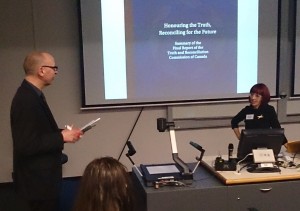
CROCC Director, Tony Ballantyne, who chaired the evening keynote, poses a question to Kristine Alexander.
The second day’s lineup included Lynette Townsend (Te Papa) ‘Child-made Material Culture: an Assemblage of Colonial History’; Jane McCabe (University of Otago) ‘From “Grandmama’s” to “Up the Hill”: Three Childhoods in One Empire Family; Hugh Morrison (University of Otago) ‘Children and Missions: Shifting Identities and Colonial Spaces’; Laura Ishiguro (University of British Columbia) ‘”The future of this country will depend on our children and children’s children”: the Aspirational Politics of Settler Futurity in Colonial British Columbia’; Bettina Bradbury (Victoria University (NZ) and York University) ‘”I don’t think I was ever a boy’: Edward Kearney Junior’s Memoir, Emotion, Memory and Colonial Childhood’;
Anna Gilderdale (University of Auckland) ‘”Sunbeams”, “Cousins” and “Little Folk”: Constructing Young Folks’ Social Worlds through Print, 1880-1920′; Kristine Moruzi (Deakin University) ‘Colonial Children and Charity’. The event closed with a panel discussion headed by Kristine Alexander, Helen May, Kristine Moruzi and Hugh Morrison.
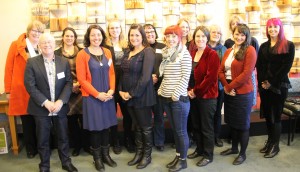
Click to enlarge. Presenters (mostly), from left: Helen May, Hugh Morrison, Christine Ergler, Jane McCabe, Anna Gilderdale, Crystal Fraser, Angela Findlay, Kristine Alexander, Susan Cahill, Kristine Moruzi, Bettina Bradbury, Laura Ishiguro, Lynette Townsend, and Michelle Smith.
Extra Media options: Dunedin TV (the local station) broadcast a two-minute television clip on the “Unpicking the Tapestry” symposium, with short cameos from a few of the presenters. Click here to view.
This was also the first time we have actively used Twitter at a CROCC event, with Angela Wanhalla (and a few others) disseminating regular tweets of snippets of presentations, and the odd photo, as the symposium progressed. These can be accessed on Twitter through #cyccs. Angela has also created a Storify package where the tweets have been collected together, and can be seen without having to have a Twitter account. Click here to access.
Thanks to Hugh and Angela for organizing these two amazing events, and to all the scholars (from Canada, Australia and New Zealand) who made their way to Dunedin to share their research.
Wellington celebration
The Centre would like to thank Professor Charlotte Macdonald who organized a celebration for The Lives of Colonial Objects on Monday evening at the Thistle Inn in Wellington.
Folk from the capital (from VUW, Te Papa, and others) are well represented in the book, and it was a great opportunity to come together, along with friends and colleagues. Two of the co-editors, Annabel Cooper and Lachy Paterson, were able to attend from Dunedin. He mihi nunui, Charlotte, for your passion and your hospitality.
An exciting symposium on colonial childhood
The Centre for Research on Colonial Culture is hosting a free two-day symposium, ‘Unpicking the tapestry: children and young people in British colonial contexts’, comprising 16 different papers on this theme by a range of scholars from New Zealand, Australia, Canada, and the USA, and with roundtable discussions to end each day’s sessions. This will be held in the Seminar Room, Hocken Collections, 24-25 August. Click here for the Draft Programme.
As part of this event, Dr Kristine Alexander of Leithbridge University, a Canada Research Chair in Child and Youth Studies, will be giving a public lecture, “A Tangled Web: Childhood, Colonialism, and Archives”. This will be be held in Burns 2, 24 August at 5.30pm. All interested people are warmly invited.
In particular the symposium is interested in addressing a number of key questions which include: What does it mean to talk about ‘colonial childhoods or adolescence’ or to think about children and young people in relation to colonialism? What colonial sites were significant or influential for children’s and young people’s lives, and in what colonial sites were children influential? To what extent were children and young people constrained by boundaries or moved fluidly across boundaries (eg. gender, race or ethnicity, nation, class, religion), and to what effect? What are the sources for excavating and interpreting colonial childhoods? What are the gaps and silences? How do we negotiate these? In what ways might a comparative approach (across colonial societies) expand or limit our understanding of colonial childhoods and adolescence? What are the significant challenges and opportunities in this field of academic enquiry?
If you are interested in attending the symposium, please contact hugh.morrison@otago.ac.nz by the end of the month.
Centre member wins Ernest Scott Prize 2015
Congratulations to Professor Tom Brooking whose Richard Seddon, King of God’s Own: The Life and Times of New Zealand’s Longest-Serving Prime Minister was co-winner of the Ernest Scott Prize for 2015, with Alan Atkinson’s The Europeans in Australia, Vol 3: Nation. Tom is the second CROCC member to have won this prize awarded for “the most distinguished contribution to the history of Australia or New Zealand or to the history of colonisation”. Angela Wanhalla won in 2014, and Centre director, Tony Ballantyne, was shortlisted in 2013. Click here for the publisher’s info on Richard Seddon.

